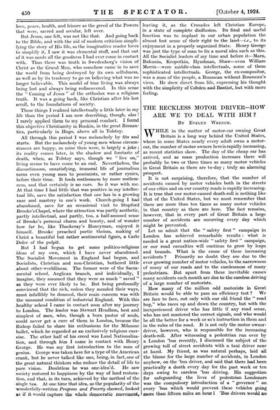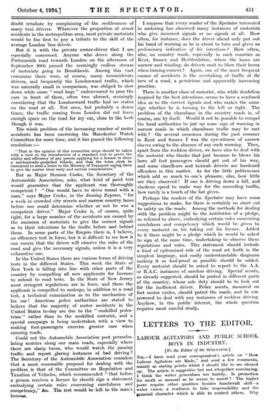THE RECKLESS MOTOR DRIVER—HOW ARE WE TO DEAL WITH HIM
?
BY EVELYN WRENCH.
WHILE in the matter of motor-car owning Great Britain is a long way behind the United States, where in some States nearly every adult owns a motor- car, the number of motor.owners here is rapidly increasing, as recent statistics show. The day of the cheap car has arrived, and as mass production increases there will probably be two or three times as many motor vehicles in Great Britain as there are to-day ; truly an alarming prospect.
It is not surprising, therefore, that the number of accidents caused by motor vehicles both in the streets of our cities and on our country roads is rapidly increasing. It is true that our motor-caused death-roll is nothing like that of the United States, but we must remember that there are more than ten times as many motor vehicles in that country as there are here. The fact remains, however, that in every part of Great Britain a large number of accidents are occurring every- day which might be prevented.
Let us admit that the " safety first " campaign in London has achieved remarkable results : what is needed is a great nation-wide " safety first " campaign, or our road casualties will continue to grow by leaps and bounds. What is the cause of these increasing accidents ? Primarily no doubt they are due to the ever growing number of motor vehicles, to the narrowness of many of our- roads and to the carelessness of many pedestrians. But apart from these inevitable causes' many accidents each month are due to the careless driving' of a large number of motorists.
How many of the million odd motorists in Great Britain would be able to pass an efficiency test ? We are face to face, not only with our old friend the " road hog," who races up and down the country, but with the inexperienced driver who has little if any road sense, who has not mastered the correct signals, and who would be all the better for a week or so's instruction in them and in the rules of the road. It is not only the motor owner- driver, however, who is responsible for the increasing death-roll. After witnessing a pedestrian run over by a London 'bus recently, I discussed the subject of the growing toll of street accidents with a taxi driver near at hand. My friend, as was natural perhaps, laid all the blame for the large number of accidents, in London anyhow, on the 'bus driver, and said that there had been practically a death every day for .the past week or ten days owing to careless 'bus driving. His suggestion for safeguarding the lives of pedestrian Londoners was the compulsory introduction of a " governor " on every 'bus which would prevent these vehicles going more than fifteen miles an hour 1 'Bus drivers would no doubt' retaliate by complaining of the recklessness of many taxi drivers. Whatever the proportion of street accidents in the metropolitan area, most private motorists would be the first to pay a tribute to the skill of the . average London 'bus driver.
But it is with the private owner-driver that I am especially concerned: Anyone who drove along the • Portsmouth road towards London on the afternoon of September 20th passed the seemingly endless stream of motorists going to Brooldands. Among this vast concourse there were, of course, many inconsiderate drivers, and frequently the Londonward traffic, which was naturally small in comparison, was obliged to slow down while some " road hogs " endeavoured to pass the cars in front of them, often two abreast, seemingly considering that the Londonward traffic had no status on the road at all. Not once, but probably a dozen times, the traffic coming from London did not leave enough space on the road for my car, close to the kerb though it was.
The whole problem of the increasing number of motor accidents has been exercising the Manchester Watch Committee for some time, and it has passed the following resolution :- " That in the opinion of this committee steps should be taken with a view to the introduction of a standard test to prove the ability and efficiency of any person applying for a licence to drive a mechanically-propelled vehicle, and that the town clerk be instructed to send &letter to the Ministry of Transport urging them to give the matter their early and serious consideration."
But as Major Stenson Cooke, the Secretary of the Automobile Association, asks, what kind of quick test would guarantee that the applicant was thoroughly competent ? " One .would• have to drive round with a man," says Major Cooke, in the Sunday Express, " for a week in crowded city streets and narrow country lanes before one could determine_ whether or not he was a competent driver." Major Cooke is, of course, quite right, for a large number of the accidents are caused by the omission of motorists to give the correct signals as to their intentions to the traffic before and behind them. In some parts of the Empire there is, I believe, an efficiency test in force, but it is difficult to see how it can ensure that the driver will observe the rules of the road and give the necessary signals, unless it is a very exhaustive one.
In the United States there are various forms of driving tests in the different States. This week the State of New York is falling into line with other parts of the country by compelling all new applicants for licences to submit to road tests. In the State of New Jersey most stringent regulations are in force, and there the applicant is compelled to undergo, in addition to a road test, a technical examination as to the mechanism of his car ! American police authorities are stated to believe that the majority of motor accidents in the United States to-day are due to the " unskilled pedes- trian " rather than to the unskilled motorist, and a special campaign is being undertaken with a view to making foot-passengers exercise greater care when crossing roads.
Could not the. Automobile Association post perambu- lating sentries along our main roads, especially where there are sharp turns, who would watch, the passing traffic- and report glaring instances of. bad driving ? The Secretary of the Automobile Association considers that a most reasonable proposal for dealing with the problem is that of the Committee on Regulation and Taxation of Vehicles, 'which recommended "that before a person receives a licence he should sign a statement embodying certain rules concerning carefulness and Competency," &c., The rest would be left to the man's honour. I suppose that every reader of the Spectator interested in motoring has observed many instances of motorists who give incorrect signals or no signals at all. How often, for instance, does the driver ahead only put out his hand of warning as he is about to turn and gives no preliminary indication of his intentions? How often, also, on country roads," especially in such counties as Kent, Sussex and Hertfordshire, where the lanes are narrow and winding, do drivers omit to blow their horns when turning corners ? Again, one of the most frequent causes of accidents is the overtaking of traffic at the turn of a road, a pernicious and apparently increasing practice.
There is another class of motorist, who while doubtless inspired by the best intentions, seems to have a confused idea as to the correct signals and who makes the same sign whether he is turning to the left or right. The problem of the charabanc in the country roads is, of course, one by itself. Would it not be possible to compel the local authorities to put up some sign of warning in narrow roads in which charabanc traffic may be met with ? On several occasions during the past summer in Kent and Sussex I was the eye-witness of narrow shaves owing to the absence of any such warning. Then, apart from the reckless driver, we have also to deal with the motorist who thinks that just because he blows his horn all foot passengers should get out of his way, and some chauffeurs and taxicab drivers are hardened offenders in this matter. As for the little politenesses which add so much to one's pleasure, alas, how little are they observed ! If one is driving down a hill, and slackens speed to make way for the ascending traffic, hOw rarely is a touch of the hat given.
Perhaps the readers of the Spectator may have some suggestions to make, for there is certainly no short cut to safety on the roads. Among the methods for dealing with the problem might be the institution of a pledge, as referred to above, embodying certain rules concerning carefulness and competency which would be given to every motorist on his taking out his licence. Added to it there might be a pledge which he would be asked to sign at the same time, undertaking to observe these regulations and rules. This statement should include a kind of epitomized rule of the road set forth in the simplest language, and easily understandable diagrams making it as fool-proof as possible should be added.
Every motorist should be asked to report to the A.A.
or R.A.C. instances of careless driving. Special scouts, as already suggested, should be posted in different parts of the country, whose sole duty should be to look out for the inefficient driver. Police scouts, mounted on fast motor cycles, should patrol the roads, and be em- powered to deal with any instances of reckless driving. Anyhow, in the public interest, the whole question requires most careful study.



















































 Previous page
Previous page